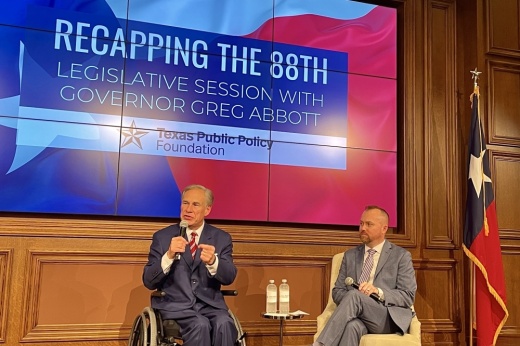Speaking to supporters at the Texas Public Policy Foundation, Abbott stood firm on his plan to “compress,” or reduce, tax rates for public school districts. This would in turn reduce how much homeowners pay in annual property taxes. The Texas House approved a version of this plan May 30, which would require the state to spend $12.3 billion to decrease tax rates and support affected school districts.
The governor said his proposal would cut school maintenance and operations taxes, which make up most of an average property tax bill, by 29%.
This is the first step toward completely eliminating school property taxes, Abbott said. He emphasized that as Texas continues to grow, the state can rely on “continued revenue streams” from sales and business franchise taxes to keep property tax rates low.
“Texans want to own their own property, not rent it from government,” Abbott said.
Abbott also addressed “doubters” and “people who question our vision,” arguing that tax rate compression is the most effective way to cut property taxes.
The fiercest opponent to Abbott’s new plan is Lt. Gov. Dan Patrick, the leader of the Texas Senate. Patrick and Abbott have typically been closely aligned on top issues, but the ongoing special session, which began the evening of May 29, has exposed a rift between the two Republican leaders.
After passing its governor-approved proposal May 30, the House adjourned “sine die,” which means it cannot meet again for the rest of the special session. The Senate met briefly June 2 but did not consider the House bills.
Abbott said he was prepared to call lawmakers back to Austin if they could not agree on property tax legislation.
‘Empowering parents’
The governor also promised to pass “school choice” legislation during a future special session.
During the regular legislative session, lawmakers considered multiple proposals to use state money to help parents send their children to private schools. But after significant pushback from the House, the bills did not pass.
Enacting school choice legislation was one of Abbott’s top priorities for the regular legislative session, alongside property tax relief.
This type of legislation would create education savings accounts, commonly known as private school vouchers. Parents who pull their children out of public schools could receive $8,000 per student to help send them to private schools. The money, which would come from taxes paid to the state, could be used to cover private school tuition or other educational expenses, like textbooks or transportation.
“I went to public schools my entire life, and if I had to do it all over again, I would not change it,” Abbott said. "But school choice empowers parents, who [are] given the responsibility to be the primary educators of their children.”
The governor said he was working with lawmakers to create a bill that would:
- Create an education savings account program
- Eliminate the statewide standardized test for public schools
- Increase minimum salaries for teachers
- Provide additional funding for rural schools
“I will never relent; I will never give up,” Abbott said June 2. “We will have a special session coming up after—after—we get property tax reform fixed, where we will dive into, work on and pass school choice in the state of Texas.”
School choice legislation has not passed during previous legislative sessions. This time, Abbott said he would “bring it up again” until the Legislature approves his plan.





